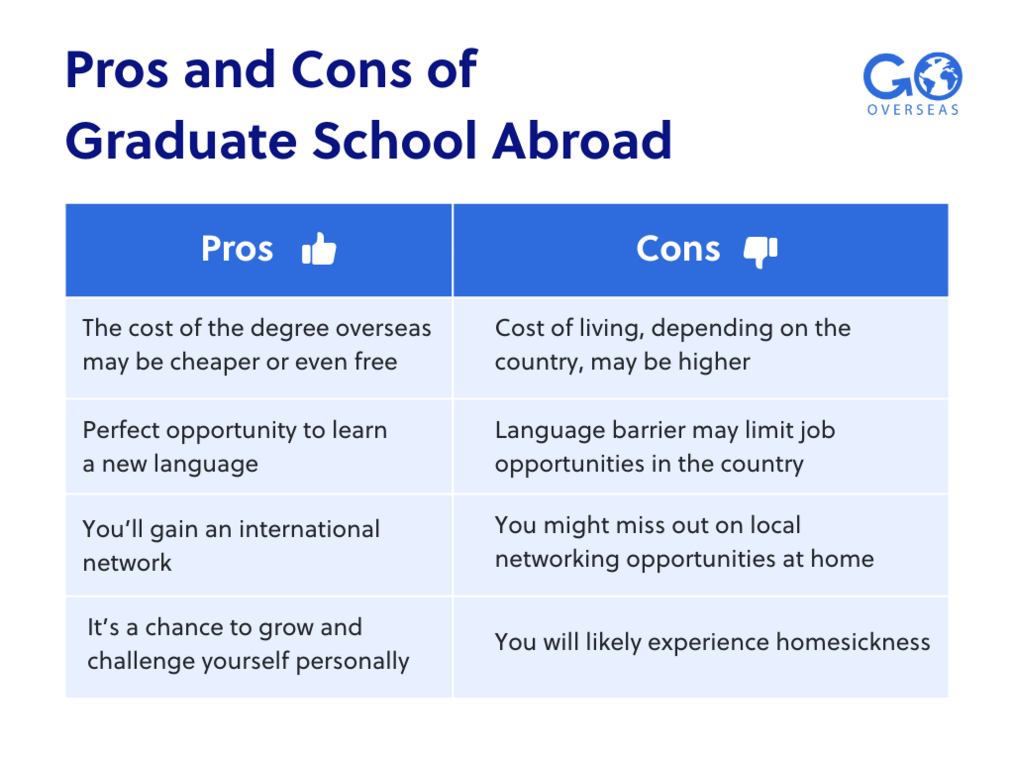
The Pros & Cons of Earning a Graduate Degree Abroad
Choosing to attend graduate school overseas is a big decision. Read on and let us help you weigh the pros and cons of earning a graduate degree abroad.
Key Takeaways 🔑
- While graduate degrees abroad may come with a lower price tag, the cost of living in your host city could set you back.
- Many international universities participate in the US federal financial aid program meaning you can obtain loans for your overseas graduate degree.
- If studying in a non-English-speaking country, you'll have plenty of opportunities to gain or perfect language skills. However, you may have difficulties finding part-time work if your fluency is low.
- You can expect to experience serious personal growth abroad, but with the possibility of moments of homesickness.
Graduate school is an important step in your education and there are many options to consider. Do you pick a school close to home or go out of state? What about a graduate degree abroad As someone who has earned master's degrees in the US and Ireland, I can confidently say there are both pros and cons to earning a master's or PhD abroad.
But should you do your master's or PhD abroad? I'll walk you through the benefits of studying at a foreign university plus potential points to consider.
Can you study abroad in grad school?
If you're wondering if you can study abroad in grad school, the answer is a resounding yes! You also have several ways to do it. You can study abroad for a short period of time or earn a full degree. Many countries whose main language is not English have a wide range of graduate programs completely or partially in English. You can even get a PhD in another country!
Additionally, some US master's programs incorporate study abroad to enrich the experience. If you're a PhD student, you can do some or all of your dissertation research abroad if it fits your field of study.
Pro: Your degree may cost less
Graduate school in the U.S. can cost you a pretty penny. While you can save money attending an in-state university, the fact of the matter is that you will likely rack up debt in the process.
According to Nerd Wallet, U.S. students collectively held around 1.74 trillion dollars in loans as of 2023. Roughly one-fifth of college graduates with student loan debt work more than one job and report higher levels of financial insecurity. If these statistics have you reconsidering graduate study, thankfully, there is an alternative.
Before deciding to pursue a graduate degree abroad in Ireland, I looked at Master of Public Health degrees within close proximity of my home in the States. A nearby private university was just over $67,000 for an 11-month program, while a public university cost around $34,500 for 18 months. Even with the conversion rate from euro to USD, I found that a graduate program at University College Dublin was only around $20,800.
There are many low-cost, high-quality graduate programs overseas. In some countries like Germany, you can study anything from biology to dance studies for free (no, that's not a typo!).
Other countries with free or low tuition graduate programs in English include:
The best part is, many international universities participate in the US federal financial aid program meaning you can obtain loans for your overseas graduate degree.
Con: The cost of living could be higher than at home

You may find yourself paying nearly the same amount in a country with free tuition as a university in the U.S. when factoring in the cost of living. Cities, both large and small, across the world are experiencing rising costs for essential things like rent and food. In Dublin, a popular destination for international students, rooms in a shared house or apartment are now going for upwards of $1,000 a month.
When budgeting and comparing costs, don’t forget to factor in expenses other than tuition like rent, utilities, food, transportation, and leisure activities.
Pro: It’s the perfect opportunity for language learning
You're likely attending graduate school to improve your job prospects. You may also want to work in the country where you attend grad school, or elsewhere abroad, after graduation.
Living in a non-English speaking country presents unique opportunities to learn the local language. Aside from personal enrichment, a second or third language is an invaluable addition to your CV. Universities tend to offer free or reduced language courses for international students even if they are studying a graduate degree in English.
Con: The language barrier can limit job opportunities
A language barrier can be a hindrance when searching for jobs abroad while in grad school or after graduation.
Most student jobs are within the hospitality and retail fields. If studying overseas, you may face difficulties securing part-time work if you don't have basic proficiency in the language. English is certainly an international tongue but it will not help if you work in a field where you need to interact with local people.
Check with your campus' career development center to find out about any on-campus opportunities for English speakers. They might also have leads for outside gigs as well. If all else fails, consider advertising yourself as a tutor for basic or academic English both at the university and in your city/town.
Pro: You can network internationally by studying your subject at the source
Doing your graduate degree abroad allows you to study your chosen subject where you are guaranteed exposure to the experts and faculty engaged in active research. Imagine studying geothermal energy in Iceland and taking a class trip to the Blue Lagoon? Nothing beats hands-on experience to complement your classroom learning.
Aside from making connections with local experts and faculty, your classmates are invaluable when it comes to networking. My master's cohort in Ireland was leaps and bounds more diverse than my grad program in the US. My fellow students came from India, Tanzania, Mexico, the UK, the US, Uganda, and of course Ireland. They held advanced degrees in dentistry, medicine, nursing, nutrition, and social sciences. Making friends with these talented individuals opened many doors across the globe for me.
Furthermore, depending on the country, visas exist to allow you to stay and work legally following the completion of your studies.
Con: Missed opportunities for networking in your home country
If you’re planning to return to your home country to work after graduation, studying abroad could mean missing out on local networking. In a competitive job market, who you know is often as important as what you know.
Attending grad school abroad allowed me to connect with numerous professionals in the public health field, although those contacts were mostly limited to Ireland. If I had planned to return to the U.S. for employment, I would have missed out on easy access to local professionals who could have acted as references or even given me insider info about job opportunities.
If your interests or career goals are hyper-local (i.e. development projects in Baltimore or Detroit), it may be more beneficial to study at a university in or near that specific city in order to engage with community leaders and local stakeholders. Overseas programs can certainly offer alternative ways of looking at problems within a field, however, for certain areas of studies, networking is the most important part of getting ahead.
Pro: Grad school abroad amplifies personal growth
Grad school is challenging in itself but when undertaken overseas, you'll find yourself constantly testing your limits. Not only will you face a different style of teaching than you're used to, but living in another country with another culture will take some getting used to. If this sounds scary, consider how much you will grow after these experiences.
A study by the International Education of Students (IES) showed that 97% believed studying abroad increased their maturity level. When it came to self-confidence, 96% said they were more confident individuals after their experience overseas.
During my master's program at University College Dublin, I found that students were expected to have a much greater sense of autonomy and ownership of their studies. In some classes, we didn't receive a syllabus. Study guides were unheard of. At times I felt like I was floating by with no direction. But rather than being defeated by this perceived lack of guidance, I learned to be more organized and engaged in my own learning.
Doing a graduate degree abroad will definitely help you grow, both professionally and personally, if you just take the leap!
Con: You may experience homesickness
A day after landing in Dublin, and quickly realizing how bad the rental market was, I found myself curled up in the fetal position on my hostel bed questioning my decision to attend grad school in a foreign country. Despite having traveled and lived abroad before, I felt overwhelmingly homesick at that moment.
This dreaded condition can strike the unassuming at any time and can hit hard. Attending grad school abroad and setting up a new life from scratch is as stressful as it is exciting. Being away from familiar surroundings can be difficult – but the good thing about homesickness is that it's temporary. By pushing through those initial unpleasant feelings, you are sure to reap the rewards.
Understand foreign degree acceptance in the US

If returning to the U.S. after earning your grad degree overseas, your credentials may not be immediately recognized. Overseas degrees in fields such as healthcare, law, and education require lengthy verification in the US by individual accrediting bodies.
Private employers and governmental agencies in the US may also require credential verification which essentially proves that your foreign degree is equivalent to one in the US. There is no one official organization to perform this service. However, World Education Services is widely used and can provide degree verification, course equivalency, and authentication that is accepted by many employers and universities.
How to apply to grad school abroad
Applying to grad school abroad may seem scary but it's not all that different from applying to programs in the US. Nearly every university regardless of country lets you apply online and generally asks for the same documents: transcripts, CV, personal statement, and recommendation letters.
To get a graduate degree abroad, you usually need to follow these steps:
- Choose the country (or countries!) you want to study in.
- Narrow down your choice of universities.
- Prepare your application documents (mentioned above), including translations if needed.
- Apply online.
- When admitted, apply for the necessary student visa.
If you have any questions or doubts, always remember you can reach out to the university's international student office. They will be happy to help guide you.
Read more: How to Apply to Grad Schools in Europe as an American
Weigh the pros and cons to see if grad school abroad is right for you
Earning a graduate degree abroad is an exciting journey but requires proper planning. If you determine that this route is right for you after weighing the pros and cons, jump into research to select the perfect course of study. Once the wheels of your graduate education are in motion, you are guaranteed a wild and seriously fulfilling ride!










